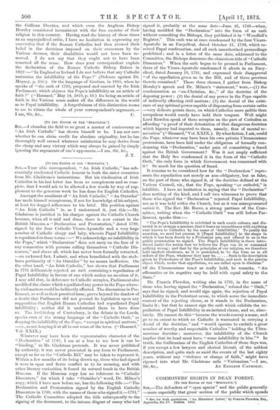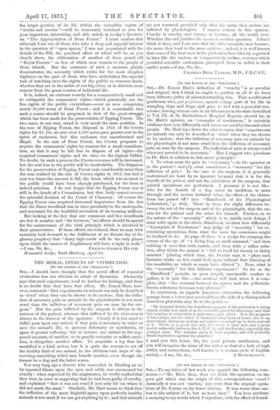COMMONERS ' RIGHTS IN DEAN FOREST.
[TO TEE EDITOR OF TUB SPECTATOR.")
Sta,—The defenders of "open spaces" and the public generally —more especially that great section of the public which spends • See, for both quotations, 'An Historical Letter," by Francis Plowden, Esq., Appendix, No. IV. Dublin. 1812.
the larger portion of its life within the unhealthy region of "bricks and mortar "—will be immensely indebted to you for your important, interesting, and able article in to-day's Spectator on "The Appropriation of Dean Forest." I must confess that although I am one of those who take a deep and especial interest in the question of "open spaces," I was not acquainted with the details of the Bill, the practical effect of which will be, as you clearly show, the obliteration of another of those grand old "Royal Forests" so few of which now remain to the people of these islands. But the existence of such a measure plainly demonstrates the necessity which exists for the most sleepless vigilance on the part of those who have undertaken the especial task of watching over the rights of the public to common lands, whether they are in the midst of our big cities, or in districts more remote from the great centres of industrial life.
It is, indeed, an extreme remedy for a comparatively small evil to extinguish the commoners' rights—which practically are the free rights of the public everywhere—over an area comprising nearly 20,000 acres of Dean Forest ; and it is remarkable that such a course should be proposed, in view of the great struggle which has been made for the preservation of Epping Forest. The two cases, in one way, stand in very much the same position. In the case of Epping Forest, the disposal in 1854 of the Crown rights for 24 10s. an acre over 4,000 acres gave greater zest to the spirit of enclosure, but this enclosure was unauthorised and illegal. In the case of Dean Forest, the Crown proposes to acquire the commoners' rights by consent for a small considera- tion, so that it may be left free to dispose of all rights—the acquired commoners' rights and its own—to the highest bidder. No doubt, by such a process the Crown revenues will be increased, but the real loss to the public will be incalculable. The litigation for the preservation of Epping Forest cost considerably more than the sum realised by the sale of Crown rights in 1854, but had it cost ten times the amount it did, the boon which was secured to the public would have been cheaply purchased, for the boon is indeed priceless. I do not forget that the Epping Forest. case is still in the hands of a Commission, but that body cannot reverse the splendid decision of the Court of Chancery. Of course the Epping Forest case acquired increased importance from the fact that the Essex woodland was in close proximity to the metropolis, and necessary for the healthful recreation of its teeming millions.
But looking at the fact that our commons and free woodlands are few in number and "far between," no efforts should be spared for the maintenance of the vital principle which is involved in their preservation. If these efforts are relaxed, then we may with certainty look forward to the fulfilment at no distant day of the gloomy prophecy that "dusty high-roads will be the only places upon which the masses of Englishmen will have a right to walk."



































 Previous page
Previous page